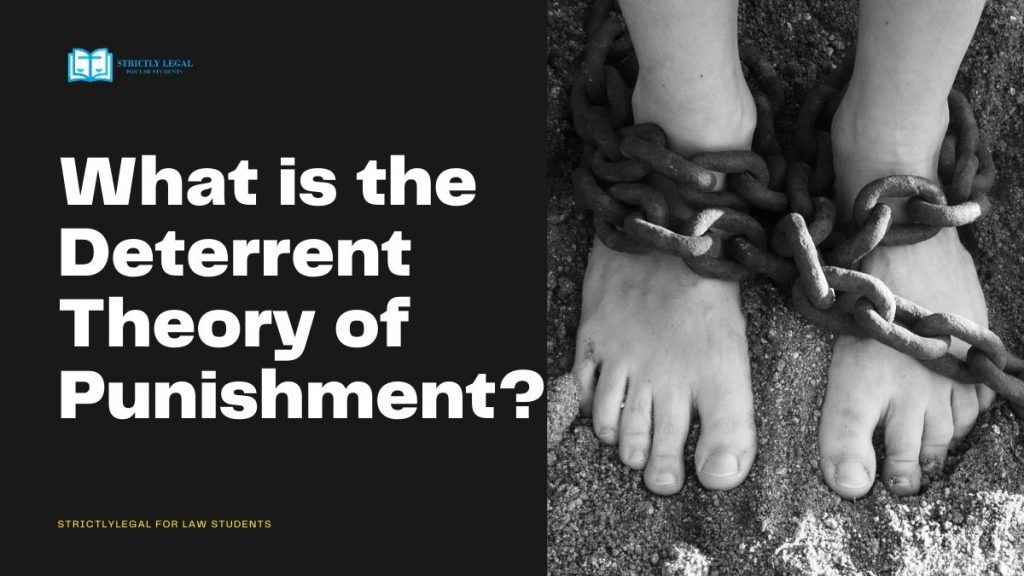Deterrent means to dissuade; it attempts to dissuade wicked minds from taking the incorrect and illegal route. Among the five theories of punishment in criminal jurisprudence, namely, deterrent, retributive, preventive, reformative, and expiatory, this particular theory imposes dreadful consequences, i.e. punitive actions against the wrongdoer, in order to curb the menaces of would-be evildoers and deters criminals from committing the crime again.
Table of Contents
Why is deterrent theory important?
Would you commit a crime if you knew you could get away with it? Let’s assume you desire a candy bar but don’t have the money to buy one. Would you steal it if you didn’t have to worry about getting caught? What about a more serious offence, such as burglary or murder?
Psychologists have been studying why individuals follow the law for decades. Is it because they have moral principles, or because they are frightened of the consequences if caught? What forms of punishment are most effective in deterring criminals? These are the kinds of questions that psychologists strive to address. Let’s take a look at some of the findings from their investigation into why individuals obey the law.
According to deterrent theory (also known as deterrence theory), individuals do not commit crimes because they are frightened of being caught, but rather because they are driven by some profound moral sense. People are most likely to be deterred from committing a crime if the penalty is fast, definite, and harsh, according to deterrence theory. For example, in the candy bar theft case, deterrence theory states that if there is a low probability of being caught or if the punishment for being caught is only a warning, you will be more inclined to steal it.
In his essay “Deterrence in the Twenty-First Century,” written in 2013, Daniel S. Nagin very vividly explained few points relating to deterrent theory, which can be summarised by stating that the fear of being caught is far more dreadful than the draconian punishment, and when the legal system is successful in punishing a criminal, it has demonstrated its power in capturing the criminal. Deterrence of crime is also aided by the police force. Police methods such as sentinels and hot zone policing are successful.
It can be concluded that the death penalty has not been very effective in deterring the most heinous crimes in society over the years. Had this been the case, there would have been only one death sentence till date for a similar type of offence. Given the increasing number of rape cases in recent decades, it is very disheartening that a complete halt to this offence has not been achieved.
Some rational thinkers in society may argue that crime has been reduced to some extent, but my question is, in a civilised society like ours, where we talk about internationalism, social networking at the touch of an index finger, hi-tech modern scientific advancements, and the like, can there be a place for a crime where the very basic rights of the human being are violated? The constant dread of exposing criminality prevents the weaker (but stronger) sex of society from living fearlessly.
The legal system is incessantly polishing its laws, strategies, procedures and interpretations in order to curb the crimes with a view to make our society more civilized and proper and the zest to do so shall be never ending. After all, it is only when the society is civilized there advents the Law and regulation for the human conduct.
The utilitarian element of the deterrence idea of punishment is evident. For a better comprehension, we may add, ‘The guy is punished not only because he did an unlawful conduct, but also to ensure that the crime will not be repeated again.’ It is best articulated by Burnett, J, who remarked to a prisoner: “Thou art to be hanged not for having stolen a horse, but in order that other horses may not be stolen”.
In English it translates to, you are being hanged for stealing a horse but in order that other horses are not stolen.
Jurisprudential School of Thought
The deterrence hypothesis is connected to the sociological school of thought in law. The sociological school establishes a link between society and law. It denotes law as a social phenomena with a direct and/or indirect relationship to society. One of the primary goals of deterrence is to set an example for individuals in society by instilling fear of punishment.
Now comes the most crucial question: “Who established this deterrence theory of punishment?”
The notion of deterrence theory may be applied to the work of philosophers like as Thomas Hobbes (1588-1678), Cesare Beccaria (1738-1794), and Jeremy Bentham (1748-1832). These social contract philosophers laid the groundwork for current criminological deterrence.
People, according to Hobbes, typically seek their self-interests, such as monetary gain, personal safety, and social repute, and form enemies, regardless of whether they damage others in the process. Because individuals are driven to pursue their self-interests, the consequence is frequently conflict and resistance in the absence of a suitable government to provide safety.
To avoid this, people agree to give up their egocentricity if everyone does the same thing, roughly. This is known as a “Social Contract.” Individuals are penalised for breaching the social contract, according to this social contract, and deterrence is the reason for it to keep the agreement between the State and the people, in the form of a social contract, functional.
FAQ
According to deterrence theory, individuals do not commit crimes because they are frightened of being caught, but rather because they are driven by some profound moral sense. People are most likely to be deterred from committing a crime if the penalty is fast, definite, and harsh, according to deterrence theory.
Deterrent theory aims to prevent any crime or further repetition of any crime.
The deterrence theory works on these three components mainly: certainty, celerity, and severity.

Passionate about using the law to make a difference in people’s lives. An Advocate by profession.




